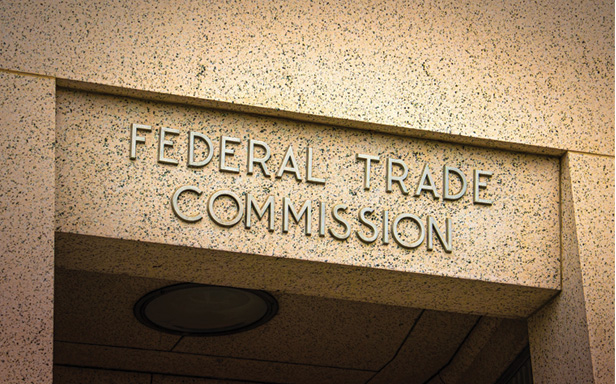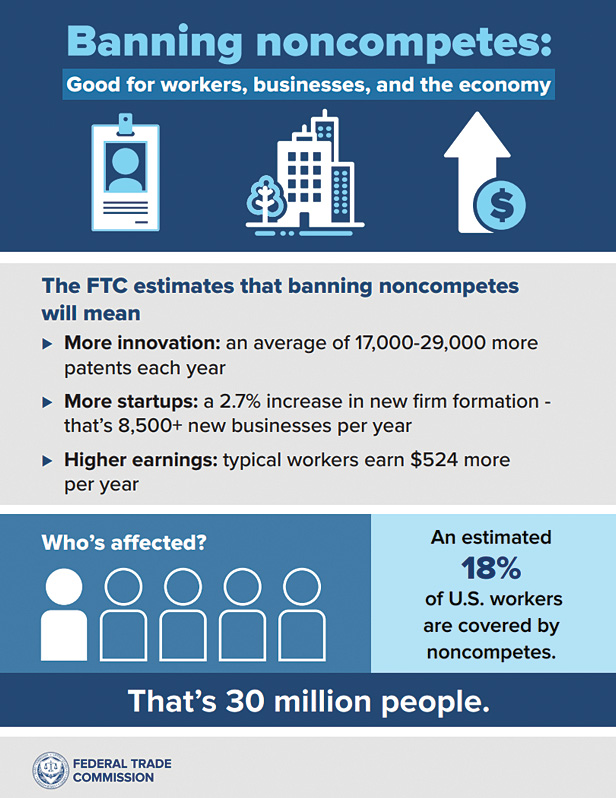News Last Updated: April 24, 2024
FTC Bans Noncompete Agreements Throughout the U.S.
The commission adopted a new final rule that prohibits the contract clauses with workers – everyone from employees to independent contractors. It's already being challenged in court.
The Federal Trade Commission has passed a new rule that broadly outlaws noncompete agreements in the United States – a development that has divided opinion in the promotional products industry.
In a split 3-2 vote on Tuesday, April 23, the FTC passed a final rule that bans noncompetes with all workers, including senior level executives, after the forthcoming effective date. The ruling also voids existing noncompete clauses with workers other than senior executives.
For senior executives, defined as those earning more than $151,164 annually, existing noncompete agreements may remain in place - but new noncompetes with senior executives can't be enacted. To current or former workers that are subject to noncompetes but not senior executives, employers will have to provide notice that the clauses are unenforceable.

The exact effective date isn't clear yet, but is expected to be 120 days after the rule is published in the Federal Register. Legal challenges have already been launched, which could delay enforcement/implementation.
In effect, a noncompete clause prohibits one party (usually a worker) from taking another job or starting a business in a similar profession and/or region that competes against another party (usually an employer), often for a set period of time.
The FTC’s final rule states the clauses are an unfair method of competition. Therefore, it's a violation of Section 5 of the FTC Act if employers enter into noncompetes with workers and/or try to enforce certain noncompetes, the majority of the commission ruled.
“Noncompete clauses keep wages low, suppress new ideas, and rob the American economy of dynamism, including from the more than 8,500 new startups that would be created a year once noncompetes are banned,” said FTC Chair Lina M. Khan. “The FTC’s final rule to ban noncompetes will ensure Americans have the freedom to pursue a new job, start a new business, or bring a new idea to market.”
Promo Reaction
Sentiment in the $26.1 billion North American promo products industry has been divided since the FTC announced that it was considering banning noncompetes in early 2023. That division remained in the wake of the vote.
“While I understand the concept of not limiting someone's ability to go and make money, what bothers me about not having noncompetes is that it theoretically allows someone to come and learn everything from your business, then go and start their own business down the street doing the same thing and going after your customers that they know buy the type of products that now you and your former employee sell,” said Tim Holliday, co-owner of Florida-based distributor Children’s World Uniform Supply (asi/161711). “As with most things, I think a middle ground would be good, like allowing noncompetes to stand for one year.”
Nancy Whitley feels differently.
“I think it should be illegal to keep someone from earning a living just because they might compete with you,” said Whitley, owner of California-based distributorship Conextions (asi/166554). “If you are hired by someone who is a ‘hell on wheels’ employer and you have to leave just to save your sanity, and you’ve signed a noncompete agreement, and what you are doing is the only thing you know how to do…then you are in a real slavery-type bind.”
“Noncompete clauses keep wages low, suppress new ideas, and rob the American economy of dynamism.” Lina Khan, FTC chair
Howard Potter thinks noncompetes help protect the financial investments employers make in their workers.
“I am for noncompetes for the simple reason that we pay to train the staff to learn our craft,” said Potter, CEO/founder of A&P Master Images (asi/102019), a New York state distributor/decorator. “If they paid us to learn, I would be okay with not having noncompetes.”
Russell Baingo, president of distributorship P’zazzz Industries Inc. (asi/155184), is glad the FTC banned noncompete agreements.
“Say an employee has worked in an industry for years, then the company lays him or her off, which happens all the time,” Baingo stated. “Now, you’re telling me he or she is not allowed to work at the same type of job in the same industry? That’s not fair to the employee at all.”

Infographic courtesy of the FTC.
More Particulars on the Rule & Court Challenges
The FTC final rule defines a worker as an employee, independent contractor, extern, intern, volunteer, apprentice, or a sole proprietor. The rule clarifies that “worker” includes someone who labored for a franchisee or franchisor, but does not apply to a franchisee in the context of a franchisee-franchisor relationship.
Notably, the rule does not apply to noncompetes entered into by a person pursuant to a bona fide sale of a business.
Meanwhile, the FTC also explained why it allowed existing noncompetes to remain in place with senior executives.
“This subset of workers is less likely to be subject to the kind of acute, ongoing harms currently being suffered by other workers subject to existing noncompetes and because (public) commenters raised credible concerns about the practical impacts of extinguishing existing noncompetes for senior executives,” the FTC’s rule said.
“This decision sets a dangerous precedent for government micromanagement of business and can harm employers, workers, and our economy.” Suzanne Clark, U.S. Chamber of Commerce
In January 2023, the FTC proposed a rule that would ban noncompetes. During a 90-day public comment period, the commission received more than 26,000 comments. The FTC maintained it reviewed and considered those comments as it formulated the final rule.
According to the FTC, the ban on noncompetes will increase the formulation of new businesses in the United States by 2.7% per year. It will also increase earnings for workers by an average of $524 per year, and lower healthcare costs by $194 over the next decade, the FTC said. The ban will, the FTC asserted, lead to an estimate average of 17,000 to 29,000 more patents each year for the next 10 years.
Still, all that assumes the ban will survive legal challenges. Melissa Holyoke and Andrew Ferguson, the two commissioners who voted against implementing the ban, said the FTC was overstepping its legal authority by going forward with outlawing noncompetes. Holyoke forecasted the ban would ultimately be kiboshed by the courts.
“We are not a legislature,” Ferguson said. “I do not believe we have the power to nullify tens of millions of existing contracts.”
Court challenges are already underway. Hardly was the FTC done approving the ban, then tax services firm Ryan LLC filed a lawsuit in Texas federal court, according to Reuters. The complaint challenges the noncompete crackdown, asserting, in part, that the clauses can benefit not just businesses, but also workers and the economy.
Meanwhile, the U.S. Chamber of Commerce and other business groups filed suit in federal court in Texas against the FTC noncompete ban on Wednesday, April 24.
“This decision (on noncompetes) sets a dangerous precedent for government micromanagement of business and can harm employers, workers, and our economy,” said Suzanne Clark, the Chamber's president and CEO.
The Chamber and other groups, which include the Business Roundtable, Texas Association of Business and Longview Chamber of Commerce, want the court to block the FTC prohibition on noncompetes. They argue that noncompetes are vital to protecting company secrets and that the FTC has gone far beyond its legal authority in enacting a ban.
The FTC thinks otherwise.
“Our legal authority is crystal clear,” FTC spokesperson Douglas Farrar said in a statement. “Addressing noncompetes that curtail Americans’ economic freedom is at the very heart of our mandate, and we look forward to winning in court.”
It’s possible a temporary injunction could prevent the ban from taking effect until court cases are adjudicated, but that is yet to be determined.
If the ban does take effect, companies could potentially use nondisclosure and non-solicitation clauses to protect proprietary information and their clients.
Nondisclosures don’t prevent a worker from seeking employment with a competitor or starting a competing business, but they can act as a binding contract that prohibits the sharing/use of sensitive information, such as trade secrets and proprietary processes. In effect, non-solicitations prevent a worker from soliciting certain or even all of a company’s customers/clients if the worker departs from the company.
*This article was updated to reflect the U.S. Chamber of Commerce filing suit on Wednesday.
